"What will the Church be like in the third millennium?" -- is the rhetorical question posed in a large article dedicated to Pope John Paul II [347]. Papists, naturally, associate the answer to this question with the Vatican and with its present head, who "from the very beginning of his pontificate has not stopped fighting for the cause of ecumenism,
reckoning that sooner or later Christian Churches will unite, and the sooner, the better, considering present-day circumstances. John Paul II... is undoubtedly aware that he is one of those capable of
making irreversible the movement which has begun today; and those in his immediate circle -- cardinal Ratzinger, Monsignor Lustiger, Monsignor Etchegaray... -- all share the same conviction" [348]
(our emphasis - L.P.)
The Jesuit principle of "the end justifying the means" is sufficiently well known, but far from everybody knows how diverse are these means which have been tried for centuries by the see of Rome for achieving its end. This end, however, has always been the same -- expansion and power.
"We regard Catholicism, in no uncertain terms, as the greatest danger threatening Russia today and tomorrow..." [349] These words of an Orthodox theologian spoken in the year commemorating the Millennium of the Baptism of Russia almost ten years ago, better than anything else characterize the disastrous state of affairs not only in Russia, Ukraine and Belorussia, but in other Orthodox countries as well, the countries which have recently shaken off Communism and found themselves in extremely difficult national and political situation. Catholics and Uniats are skilled at catching simple innocent souls, as a result of developing a most vigorous activity amongst people who for decades had lived in a spiritual vacuum of atheism and Marxist-Leninist materialism, who in many cases did not receive even an elementary catechization, and who did not even know how to make a sign of the cross over themselves correctly.
The Balamand Agreement with anathematized Latins, "consigned to eternal disgrace and condemnation" as the "blasphemers of our God", who have never repented their age-old heresies and errors, "is in its essence a continuation of the Second Vatican Council" [350].
This artificial, diplomatic union concluded in defiance of dogmatic and canonic differences, is being implemented in accordance with the Papists' plan at the time which is most unfavorable for the traditionally Orthodox nations. Like in the old days, the Roman Curia, taking advantage of the unfortunate state of affairs in Russia, directs its blow at the very heart of the people -- at holy Orthodoxy. Papists predict that: "One may expect that the events will accelerate. The Vatican has a sufficient number of talented diplomats capable of finding ways for reconciliation which the Christian world has been awaiting for nine centuries" [351].
Advocating unification, the Vatican poses as a benevolent peacemaker, who desires to overcome the "age-old stagnation and retrogression" of Orthodox Christians. However, contrary to a preconceived opinion, which is widespread in the West, the true Orthodox Church has never ceased to strive for the unity which was violated by the heretics. It daily prays that those who have fallen away from it would
convert to knowledge of the truth, i.e.,
would become aware of their errors and heresies and repent of them, thus making the long awaited union in truth possible. But ecumenists are in no need of the truth, they replace it by a "solidarity in prayer" [352], without even raising a question of dogmatic unanimity.
The trouble of the contemporary "official Orthodoxy" lies in the fact that its first hierarchs and representatives express complete indifference to
true faith and thus inevitably lead their flocks to a union not only with papists, but all other heretics as well. According to Bishop Gregory (Grabbe), all official representatives of Eastern Churches, with an exception, to a certain extent, of the Church of Jerusalem "by following Constantinople, ... have already embarked on the path of betrayal of Orthodoxy and, at any rate, have in their heart made an advance decision to do so" [353].
It is no longer a secret that the Vatican has not only the ever-increasing number of converts to Uniatism and Catholicism in the traditionally Orthodox countries, but also causes alarm by the number of bishops and clergy of Local Churches who are either secret residents, or overt agents of papist influence. The Vatican fights Orthodoxy not only by its "talented diplomats", but also by employing subversive methods and means thus attaining its age-old objective.
One cannot help recalling the sinister figure of the late Metropolitan Nikodim (Rotov) of Leningrad who in his time has consecrated half of the bishops of the Moscow Patriarchate, Patriarch Alexius II among them, and who has thus left worthy successors who continue promoting his cause after his death.
Many people still remember that in the mid-70ies the faithful would drive him out of the Moscow churches shouting: "Be gone, you heretic, you Catholic!" [354]. Rumors, which circulated in Metropolitan Nikodim's lifetime about him being a secret Catholic, have recently been confirmed. This malicious ecumenist and enemy of Orthodoxy, who had celebrated liturgy in St. Peter's Basilica in Rome and offered Communion to Catholics, met his death in the arms of Pope John Paul I at the age of 49 (Sept. 5, 1978). As reported in the Catholic press [355], Metropolitan Nikodim was a secret Catholic bishop whom Pope Paul VI had appointed to secretly look after the entire Catholic-Uniate jurisdiction of the former USSR [356]. This double agent of the KGB and the Vatican did a great deal for the propagation of papism among the Orthodox. His efforts bore fruit which are evident even today, nearly two decades after his death. He promoted not only Patriarch Alexius II, but also other most influential bishops of the MP, such as a fierce ecumenist Metropolitan Kirill (Gundyaev), a former cell-attendant of Nikodim and the present Chairman of the Department of Foreign Relations of the Moscow Patriarchate, who does not hide his pro-Catholic sympathies and tendencies; Archbishop Michael (Mudyugin); Archbishop Chrysostom (Martishkin), also a former cell-attendant and pupil of Nikodim (as he always calls himself) [357], who tirelessly propagates papism and inter-communion amongst the Orthodox in Lithuania; numerous clergy ordained and singled out by Nikodim, whole generations of his pupils and followers continue the work begun by him, misrepresenting the righteous ways of the Lord. Consequently, one may assume that the words of John Paul II spoken at the end of 1992 with reference to the Roman Curia having two cardinals amongst the bishops in Russia are not only factual but much too modest!
Lately, particularly following the Balamand Agreement, the Vatican has been widely practicing corruption of Orthodox clergy by granting them travels, scholarships, allowances, and a chance to study in papist schools of theology. Sometimes the result of the papist education surpasses all expectations, as one can see from the example of Patriarch Bartholomeos of Constantinople, who studied at the Gregorian University in Rome.
The Vatican carries out its proselytism with the help of the refined old method of Uniats and by offering material assistance, this usual trap of all Western missionaries. Worthy of note and imitation in this connection are the measures recently employed by Patriarch Diodoros of Jerusalem, in order to stop the ravaging of his impoverished flock by ecumenical "benefactors". Patriarch Diodoros made a statement of protest against aggressive heterodox proselytism and rejected any ecumenical contacts. Regrettably the analogous disastrous situation which has lately taken hold of the Moscow Patriarchate, does not prompt its hierarchs to pass such an Orthodox resolution.
Evil may present a very "noble" appearance, but it remains evil just the same. It is frightening to hear that
"the head of the Roman Catholic Church, Pope John Paul II has become the first honorary member of the new parish of the Moscow Patriarchate in the city of Ulyanovsk". The parish council of the Resurrection Cathedral, presently under construction, appealed to the Pope of Rome for a donation to their building project. The Pope responded by sending $14,000 (US) to this Orthodox parish [358]... This is only one of many instances of ecumenical ideology, this triumphant religion of our century, being implanted into Orthodox parishes.
But why speak of an individual parish when the Bishops' Council of the MP itself (1994)
approved innovations unknown to the holy Church from the beginning of its existence until today. One of them was the decision to permit common prayers with the heterodox upon the blessing of a ruling bishop [359]. Not being able to justify this anti-canonical innovation by the Rules of the Universal and Local Councils, by Patristic theology and the entire holy Tradition, the above Council of the MP resorted to a rather dubious argument -- it referred to the fact that the ecumenical prayers area well-established practice in other Local Churches. Considering a more than deplorable spiritual state of some Local Churches (those of Constantinople, Alexandria, Antioch, Finland and others) one cannot but agree with the following comparison drawn in this connection.
"This situation is similar to a hypothetical one when a new canon would be issued permitting adultery. Inasmuch, of course, as no references for its justification could be found, the authors of the canon would simply base it on a generally accepted practice of today. Such analogy is not an exaggeration. After all,
is not ecumenical prayer the same as spiritual adultery, which is as much more dangerous than the physical one, as the soul is superior to the body."
[360]
Particularly outrageous substantiation of ecumenism, both demagogic and deceitful throughout, was presented by Metropolitan Filaret (Vakhromeev) of Minsk, Exarch of Belorussia and the Chairman of the Synodal Theological Commission of the MP [361]. Just as in his report at the Council of the MP in 1988, when attempting to justify the sin and heresy of the Moscow Patriarchate and its widespread practice of "ecumenical prayer for Christian unity", this bishop who has lost any fear of God, juggled facts when he insisted that our Church has its own, long since established "ecumenical tradition" [362].
Metropolitan Filaret does not take the trouble to refer to patristic teaching on the Church unity, to St. Irenaeus of Lyon, St. Cyprian of Carthage, the Great Universal Teachers and Bishops Basil the Great and John Chrysostom. When naming Metropolitan Filaret (Drozdov) he does not specify that he has in mind an early work of his, which was written by him as a young archimandrite when he was not quite free from the influence of Western theology, and which has nothing to do with his later works [363]. When citing the names of Bishop Theophan the Recluse, St. John of Kronstadt, and St. Patriarch Tikhon, Metropolitan Filaret does not quote their original words about Western apostates, such as, for example, the words of St. John of Kronstadt: "O Lord, You are the true Lord of creation. Only think what they are plotting against Russia and against Your holy Church, those Finns, Poles and Germans who have fallen away from Your Church? Only think of their scheming! They want to do away with us, and to destroy Your Church, Your prayer houses, Your services, Your rules, resolutions of the holy Apostles and the holy Fathers of the Universal and Local Councils. What have we come to!" [364].
In his speech, intended to justify the doctrinal apostasy of the Moscow Patriarchate, Metropolitan Filaret did not go to the trouble of mentioning the important works of archpriest E. Akvilonov; works of Blessed Metropolitan Anthony (Khrapovitsky) of Kiev, who is hated by the Moscow Patriarchate and is never mentioned by Sergianists; outstanding writings of hieromartyr Archbishop Hilarion [365] -- all these works which completely reject the idea of ecumenism as it is preached by the Moscow Patriarchate.
Those who are familiar with Church history know that the relations which started out at the beginning of the 20's between the Russian Orthodox Church and the Protestants, in particular with the Anglican Church, have nothing in common with the present pernicious ecumenism of the "Orthodox" apostates. Bishop Gregory writes: "When Western Protestants-ecumenists first turned to Orthodox theologians, the latter regarded these steps with a well-disposed attention. They thought of this Protestant move as an attractive and interesting development which demonstrated dissatisfaction of Protestants with their own ecclesiology, acknowledgment of their own dogmatic crisis, and their quest for truth" [366].
The World Conference of Christian Communities was planned to take place in America. The Commission for the organization of this Conference began its work before the First World War. When its Secretary Robert Gardiner began his correspondence with Orthodox theologians he received some very Orthodox and very remarkable explanations regarding Church unity. In the course of 1915-16 the journal
Vera i Razum (Faith and Reason) published Robert Gardiner's correspondence with "the most enlightened hierarch of the Russian Church, Archbishop Anthony"
(Khrapovitsky, who subsequently became Metropolitan of Kiev -L. P.). Hieromartyr Hilarion (Troitsky) wrote to Gardiner that this correspondence "appears to be... the most significant phenomenon in Russian theology during the last two years" [367].
But from the 1920's onwards, the Russian Orthodox Church Abroad, headed by Metropolitan Anthony (Khrapovitsky), began treating ecumenism with great caution, and was able to prophetically discern this movement's disposition to spiritual minimalism and compromise. In 1938 the Second Pan-Diaspora Council of the Russian Orthodox Church Abroad defined the basic features of ecumenism characterizing its present anti-Christian essence [368]. Subsequently this made it easier for our Church to keep away from and to have nothing to do with this movement, and, finally, in 1983
to anathematize ecumenism as the heresy of heresies, thereby accomplishing an act of universal significance.
Regarding the 1920's activities of the Patriarchate of Constantinople and those of the Yevlogians led by archpriest Sergei Bulgakov, who half a century ago had voiced his opinion in favor of eucharistic communion with Anglicans and had even compiled an ecumenic prayer; and Metropolitan Platon (Rozhdestvensky) who had fallen away from the Russian Orthodox Church Abroad -- they all are well characterized by the Epistle of the Bishops' Council of the Russian Orthodox Church Abroad to its North American flock (1927): "Leave Metropolitan Platon and his obedient bishops and clergy. They themselves are perishing and are dragging you down with them to eternal perdition" [369].
A well known ecumenist, archpriest Vitaly Borovoy, putting into practice the conciliar resolution of the Moscow Patriarchate was much more precise and laconic than Metropolitan Filaret. Priest Timofei Selsky writes that in the spring of 1995 at the Moscow Colloquium marking 30 years since the Second Vatican Council V. Borovoy put forward a formula as vivid as a poisonous mushroom, which will, probably, grace new textbooks of ecumenic theology:
"we are true to ecumenism, because we are true to Christ" [370]. It is noteworthy that even the liberal
Pensée Russe referred to Borovoy's report as sensational.
Should one, therefore, be surprised when Archbishop Lev (Tserpitsky) of Novgorod welcomes the heterodox with generous "eucharistic hospitality, offering them Communion of Christ's Blood and Body during a solemn Liturgy
on the feast day of Dormition of the Mother of God in the ancient Russian Orthodox Cathedral of St. Sophia" [371]. This information was included in the report about the Colloquium (27 Aug. - 2 Sept, 1995) which was organized by the Association of European Colloquia on Culture, and took place in Novgorod and St. Petersburg. It attracted more than 200 participants from 15 European countries who "jointly reflected on... the means of building an open and brotherly Europe which again has discovered its Christian roots and is now breathing
with its "two lungs", the Christian traditions of the West and East."
[372]
Archbishop Feodosy (Protsyuk) of Omsk has not only received legates from the Vatican and openly concelebrated with them, even the Divine Liturgy, but presented well-known Verenfried with an "episcopal cross..., thus becoming an inseparable friend" [373] of the wealthy Catholic sponsor.
The practice of offering Communion to the heterodox (see the Chapter on the Profanation of Holy Mysteries) is reaching epidemic proportion in the MP. This may be illustrated by the state of affairs in the Kaliningrad vicariate of the MP which is one of the ecumenical establishments and is ruled by Bishop Panteleimon (Kutov), a subordinate of Metropolitan Kirill (Gundyaev). In connection with the building project (still only a project, although some donations have already been collected a long time ago) for a Cathedral in the former Koenigsberg (now Kaliningrad), local parishioners hope that "this will be an Orthodox church not only by its name. Unfortunately, Bishop Panteleimon's ecumenical views leave little hope that in the new Cathedral things will be any different from what they are now in the patriarchal churches of the Kaliningrad area,
where Orthodox people are offered Communion from one chalice with heretics. Bishop Panteleimon himself felt no embarrassment when he declared that "Catholics ...partook of Communion in our churches, and the priests offered prayers for them" [374].
Ecumenical epidemic has spread to even the remotest areas. In accordance with the Balamand Agreement, the same church buildings are now being regularly used by representatives of different denominations (particularly in the Baltic States). In the village (!) Yegla of Borovichi region of the Novgorod district they are building a church which
right at the start will be intended for ecumenical services. It will have
three altars: Catholic, Protestant and "Orthodox". The number of such ecumenical prayer houses in Russia is growing.
The Aid to the Church in Need -- is the name of the Vatican organization which has undertaken to "save" the Russian Orthodox Church from its difficult lot. "Need" is understood in a candidly materialistic sense: shortage of money (dollars in particular) for the restoration and building of churches and for buying cars (preferably of Western make), also to supplement the allegedly insufficient incomes of clergy. Corrupt clergy of the MP who do not place their trust in the Lord and who have completely forgotten the fact that the Savior Himself, along with His disciples -- the poor fishermen, possessed nothing, complain about their "poverty" and stretch out their hand to their wealthy "sister", having no aversion to her silver pieces. Only Jesuit minds could devise the Vatican's plan to bribe Orthodox priests. Unprecedented in its cynicism, this bribe takes the form of a yearly subsidy of $1,000 USA (to every clergyman of the Moscow Patriarchate)! Taking advantage of money-loving ecumenists-Sergianists, who are accustomed to compromises, papists are literally taking over Russia.
With the help and connivance of bishops of the MP a real spiritual enslavement is now taking place in Russia. According to an "Orthodox" legate of the MP in Rome [375], Russia has become the "land of mission", or an "ideological colony" to be more precise. The terrible blame for the ravaging of Christ's flock lies, first of all, on the hierarchs-apostates of the MP, especially on its First Hierarch -- Alexius II.
An impressive picture of the Vatican's penetration into Russia in our own time and for all to see is presented in the "Appeal" to Patriarch Alexius II, written at the end of 1995 and signed by several Moscow priests [376].
Taking advantage of the freedom of action, possible only in the "territory of mission", which they have declared Russia to be, the Latins and the other heretics-apostates, open educational, welfare and missionary centers, parishes and entire dioceses throughout the former Russian Empire, even in the places which never had any Catholic population. For this purpose they use huge sums of money which are allocated to them by the Vatican and the other interested organizations.
From time to time the Moscow Patriarchate complains about the insufficiently protectionist Russian legislation dealing with Church matters and about the other parts of the "price that have to be paid for democracy". The authors of the "Appeal", however, speak of different matters. They cite numerous instances of direct
assistance which the Moscow Patriarchate renders to
Latin propaganda. They list ecumenical, or purely Catholic radio stations
(Sophia, Blagovest /Glad Tidings/, and periodicals (Simvol, Istina i Zhizn', Novaia Evropa, Russkaia Mysl', /Symbol, Truth and Life, New Europe,
Pensée Russe/, etc.) in which, along with Catholics tirelessly work as active contributors and sometimes even managers, such well-known members of the Moscow Patriarchate as archpriest Ioann Sviridov (contributor of the Department of Religious Education and Catechization of the MP), hegumen Innokenty Pavlov (Secretary of the Russian Biblical Society), priest A. Borisov (President of the same Society), Hegumen Ignaty (Krekshin) -- Secretary of the Synodal Commission for the Canonization of Saints of the ROC, hegumen Ioann Economtsev (Rector of the Orthodox University of St. John the Theologian), V. Nikitin (the Chief Editor of the official journal of the Department of Religious Education and Catechization
Put' Pravoslaviia /Orthodox Way/, "priests journalists" G. Chistyakov and V. Lapshin, priest G. Ziablitsev (employee in the Department of Foreign Church Relations of the MP), who was appointed by his superior Metropolitan Kirill (Gundyaev) to the commission of the Catholic Church (!) for the canonization of one of their saints. The authors of the "Appeal" voice their indignation: "Such a scandalous fact -- i.e. participation in a heterodox enterprise of a canonical character -- has not been heard of since Latins fell away from the Church of Christ in 1054".
The persons mentioned above and many who remain unmentioned constantly address people through all mass media on behalf of the Orthodox Church, but speak in defense of the false teaching of Catholics, mock at patristic theology, and preach the imaginary identity of Orthodoxy with Papism. (At this point one feels compelled to recall the pronouncement made by Metropolitan Nikodim /Rotov/: "How senseless and unworthy of a Christian are fanatical arguments about faith"!) [377].
The Moscow priests write to Alexius II: "One is left with the impression that the Vatican is attempting to create within the Church a layer of clergy loyal to the Catholic doctrine who serve the cause of union" (or who implement
the Union, already concluded in Balamand -- we should add).
We do not doubt the sincerity of apprehensions expressed by them, but the "devoted subjects" of the Patriarch (as the authors of the "Appeal" refer to themselves) must have known that one year before their "Appeal", i.e. in Nov. 1994, Alexius II himself, in his report to the Bishops' Council of the Moscow Patriarchate spoke favorably and at much greater length of the activity of the abovementioned organizations, radio programs, periodicals and their contributors, which were so strongly censured in the "Appeal", and referred with gratitude to the large amount of dollars, which the Patriarchate received from Catholics and Protestants [378]. And the Bishops' Council in full strength (not just some "layer of clergy") was completely unanimous with him. The editors of
Pensée Russe must have felt quite amused when they published the "Appeal" in which
Pensée Russe is severely criticized as both Catholic and a merely Russian-language (rather than Russian) newspaper.
It should be noted that approximately at the same time Alexius II received other pleas in addition to this letter of appeal which implored him to defend the Church against Latins. The monks of the Valaam monastery have requested him to resist ecumenism, and the Union of Orthodox Brotherhoods requested him to act against Neo-Renovationism. The Patriarch remained silent, as usual, or employed some diverting "maneuvers". However, both groups began spreading some reassuring rumors about the Patriarchate having reformed, or beginning to reform, or wanting to begin! Who knows, may be someone will read these appeals and think that the Moscow Patriarchate along with its "Patriarch" is deep-down Orthodox, but that a certain "layer of clergy" is spoiling it all.
But how, then, can one explain the war against Orthodoxy waged by the editorial office of the Catholic "Christian Ecclesiastical and Social Channel", radio
Sophia broadcasting from the Moscow University 17 hours a day to about 20 million people? In 1996 this channel received $750,000 more from the above mentioned Catholic organization
(Aid to the Church in Need, Inc.) This radio station is enjoying the support of many bishops of the MP, it has received the
blessing of Patriarch Alexius II who himself took part in some of that radio's programs during Great Lent [379]. The most active contributors to the work of this radio channel are mockers and blasphemers who officially call themselves "Orthodox priests", mentioned above. Here are some of their statements made on radio Sophia.
- Priest Vladimir Lapshin:
"As to the feast day commemorating the Entry of the Most Holy Theotokos into the Temple, we shall be honest: most likely such an event did not and could not really have taken place..." (Radio
Sophia, 8.1.96)
"You remember... during the period of stagnation we were not allowed to criticize the Communist Party of the Soviet Union, to criticize the Politbureau, to criticize our country, and now... we are not allowed to criticize the Church". (Radio Sophia, 17.12.95).
"As to Catholics, I will be honest, for me Catholics are just as Orthodox as those who call themselves Orthodox, i.e. I do not even want to separate them. Not a single Universal Council (!) has condemned Catholics of any heresy..." (Radio Sophia, 29.10.95)
- Hegumen Innokenty (Pavlov):
"As to "slang", well, the Church Slavonic language is the Church slang! Understand?.. I speak of this as a philologist". (Radio Sophia, 8.1.96)[380].
- Priest Georgy Chistyakov (from his reply concerning the Orthodox faith): "I, for instance, do not know whether it is the most correct one, or not. Honestly, I do not know!" (Radio Sophia).
When replying to the question "what attitude of Orthodox Christians should be towards Moshiah whom the contemporary Judaists are expecting?", Chistyakov said: "But you, surely, know that Moshiah is Christ. This is how you should think of him!" (Radio Sophia,19.10.95).
"The struggle for the purity of Orthodoxy resembles the struggle for the purity of Communist ideology". (Radio Sophia, 21.09.95).
"About St. Nicholas - we know from his life, alas, only one fact: that he "secretly passed on three little parcels of gold".
"St. Nicholas' presence at the First Universal Council -- is a legend" (Radio Sophia, 7, 9.11.95).
(In other words, Holy Tradition, in Chistyakov's opinion, tells fables - L.P.)
"The greatest service of St. Joseph of Volotsk, which led him to sainthood, is that this monk, being very thrifty person by nature, had made his monastery a model farm, surrounded himself by people who were also thrifty like him, stored grain and other produce in the monastery's granaries, and when famine began in Russia, where do you think humanitarian aid came from? Not from abroad, but from the Joseph of Volotsk monastery... As to the controversies in which he was involved
(i.e. St. Joseph's famous struggle against the Judaizing heretics - L.P.), they were of important for his time, but now all this is a matter for Church historians to deal with, not for us..." (Radio
Sophia, 31.10.95).
"St. Mark of Ephesus regarded the customs and traditions of the Byzantine Church as dogmas and therefore objected only to customs associated with the Roman ritual, not to any particular Catholic doctrine (sic!)... Rejection of those forms of Christian unity which were suggested at the Florentine Council
(i. e. the Unia - L. P.) led St. Mark also to reject Western spirituality as such, and any idea about Christian unity. However, we venerate St. Mark as a saint not for his theology, but for the purity of his life as a good shepherd of his flock in Ephesus" (Pensée Russe, No. 4106).
"Bishop Mark of Ephesus would solve the questions of faith by means involving purely classical discussion techniques... We must say that saints are no gods... In the faith of Latins Mark of Ephesus saw primarily a threat to the status quo and opposed contacts with the West for one reason only: to preserve everything the way it was in his childhood, his youth, while it was clear to one and all that the Empire has come to an end. The Empire was receding into the past, into non-existence. And living in such tragic conditions,
he simply could not help being a conservative." (Radio
Sophia)
In the "Appeal" of the Moscow priests addressed to Alexius II in connection with this tendentiously false interpretation of Chistyakov, we read: "... G. Chistyakov was trying to prove to his listeners that the deed of Great Confessor of Orthodoxy, St. Mark of Ephesus, who defended the purity and truth of Orthodox teaching against Latins at the Council of Florence, may be explained as solely ... a
struggle for the perishing Byzantine Empire which was in a state of ruin. It is generally known that exactly the opposite was true: the government of the Empire insisted on the Unia precisely because it hoped to receive Western help against the Turks. Thus, in G. Chistyakov's opinion the dogmatic differences between the Latin faith and Orthodoxy are of no significance, inasmuch as they were engendered by historical conditions of previous epochs (which
greatly resembles the explanations of Marxist historians who account for the spiritual deeds of many Orthodox ascetics by changes in social formations and class contradictions of the era)."
[381]
- A Listener's question:
Fr. Georgy, in one of your broadcasts you literally said that many fathers of Philokalia have made statements which are rather dubious from the point of view of theology..."
- Priest Georgy Chistyakov's reply:
"Basically the Egyptian monks, whose writings constitute Philokalia, guide man to a life outside society... and such an... ascetic idea is not quite, I repeat,
is not quite Orthodox! Well, what can you do! The authors of these texts were holy people and great ascetics, but, as you know, there is no man alive who has not sinned. We are all people and we all have a right to make mistakes. Even saints erred. God alone does not err!" (Radio
Sophia, 23.01.96).
"The mystery of iniquity" is no longer a
mystery! Blasphemers of the Moscow Patriarchate are ready to do a great deal to please their powerful "sister" and their ecumenical "brothers". We would fill many pages to merely list, let alone describe, all the instances of impudent lies and mockery of holy Orthodoxy and of the venerated saints, the number of ecumenical prayers performed all over the world, and, following the Balamand Agreement, ecumenical services as well, which represent a triumph of an unimpeded Papist propaganda!
Alongside the systematic defamation and rejection of the historic authenticity of Orthodox saints, particularly of ascetics and confessors who struggled for the purity of the Orthodox Church, we see not only the spreading of the cult of certain exalted Latin individuals and pseudo-saints, but also preparations being made in the bosom of the Moscow Patriarchate for an official canonization of Catholic "saints", among whom there are sworn enemies of Orthodoxy. Thus, in 1997, Moscow Patriarchate is planning a festive church ceremony of glorification of one of the most popular Latin "saints" -- Bishop Adalbert Voichek. In 1995, during his meeting with a Catholic Archbishop Tadeush Kondrusevich, who is operating in the European part of Russia, Alexius II made a promise to "complete the process of canonization" by 1997 [382]. In 1997 the Vatican will widely celebrate 1000 years after Adalbert's death. His veneration has been cultivated by papists for centuries, particularly in Slavic countries. "Even a cursory scrutiny of the life and work of Bishop Adalbert may easily convince one that he was one of those representatives of the Latin Church whose actions became the reason for the tragic falling away of Western Christians from the Church. Adalbert Voichek was a worthy and like-minded follower of that section of the Latin-German clergy which fiercely attacked Sts. Cyril and Methodius and with all the power at their disposal tried to destroy the results of the God-pleasing activity of these missionaries in Slavic lands" [383].
Today's missionaries-papists together with their "Orthodox" collaborators are increasingly spreading Latin faith in Eastern Europe and Baltic states. Thus, in Kaliningrad (Koenigsberg) there is an active "Catholic Community of St. Adalbert" which publishes the
Catholic Messenger in Russian language. One of its articles reports that recently in the Cathedral of Kaliningrad "the faithful of several Christian denominations... were praying for peace... Prayers were conducted by: Bishop Panteleimon of the Baltic region (MP), Abbot Arnold of the Teutonic Order (the same Order which at the time of St. Alexander Nevsky was with unusual cruelty wiping out Orthodoxy in the North-West of Russia!), "a Protestant pastor and other clergy" 384. It appears that such ecumenical measures are preparing the ground for the blasphemous canonization of heretics and persecutors of Orthodoxy by the Orthodox Church. It should be added that "Orthodox" ecumenists can accomplish the glorification of Latin pseudo-saints with "utmost simplicity: by automatically entering their names in the Orthodox Church calendar" [385].
Bishop Ignaty (Bryanchaninov), a profound expert in patristic tradition, gave a clear characteristic of Latin pseudo-sainthood [386], amongst the representatives of which he named such "ascetics" as Francis of Assisi, Thomas a Kempis, Ignatius Loyola, whom he considered to be in spiritual delusion. To this list of names may also be added Josafat Kuntsevich, the violent promoter of Roman Unia in Western Russia, and, of course, Adalbert Voichek, a persecutor of Orthodox Slavs. The forthcoming canonization of Latin "saints" by the Moscow Patriarchate will be one more step in its advance towards apostasy.
Papism, this traditional enemy of Orthodoxy, is at present triumphantly occupying Russia, and without having declared war is taking possession of Orthodox souls. Its brash and deceitful preachers together with heretics of all persuasions, under the guise of benefaction and "re-evangelization" annihilate the true faith of the people poisoning their already tormented souls. These enemies of Orthodoxy make their presence felt everywhere -- in Moscow and St. Petersburg, in the Volga region, in Novosibirsk, in the Altai region, in Omsk, Vladivostok, Tyumen, Magadan and Krasnoyarsk, not to speak of Ukraine, especially the Western Ukraine, where they feel completely at home. As we said before, Papists offer "assistance" also to Orthodox Theological schools by supplying them with teachers, and giving their students, i.e. future priests, a chance to study abroad.
Thanks to their "assistance" the Church in Russia has been plunged in such a state of distress that only a miracle could save it!
It is impossible not to feel deep anguish when reading reports in the Catholic press, triumphant in the accomplishment of its mission to "re-evangelize" Russian people. One may think that they are dealing with some savages, and not with the people who have been the guardians of Orthodoxy for one thousand years despite all sorts of historical misfortunes and possibly, even because of them.
Thus, the Bolshevik terror and the subsequent persecutions, unprecedented in the history of Christianity, have given Russia hundreds of thousands of martyrs and confessors. Having the appearance of a slave, mutilated by its fierce haters Lenins, Stalins and other legions of evil men, Russia, which began its existence when it met Christ and which has never forgotten "the love of its youth", shone with glory before the Lord following its fall as an Empire on the threshold of Apocalypse for its steadfast confession of faith and its martyrdom. But what if the Third Rome is primarily a spiritual phenomenon? Then one could assume that it was,
namely, in the image of a slave that Russia has become the Third Orthodox Rome, the subject of elder Filofei's prophecy... Both the first
Orthodox Rome, and the second formerly Orthodox Constantinople, "fell" and their swift
fall (particularly today) has essentially become the
falling away from Orthodoxy. Applying only historical, political, or other only too human rational yardsticks, the West is incapable of discerning the true metaphysical greatness of Russia, just as it is unable to understand that in a spiritual sense
"there will be no fourth Rome"!
Holy Russia has never died and it never will die. Holy Russia is not a myth, or a forgotten past, it is a living reality. Despite the unequal forces, it always overcomes the apocalyptical serpent.
"God is not the God of the dead, but of the living" (Mt. 22,32). Thus, the righteous ones, who have accepted martyrdom for Christ, and the Tsar-Martyr, all intercede in Heaven for their earthly homeland.
We believe that those Russians who find themselves entangled in the net of apostates, will recover their sight and turn away from spiritual adultery into which they are drawn by all kinds of missionaries, preachers, "benefactors", and seducers waging the cruelest war against the holy Orthodoxy.
"O God, settle my quarrel with this haughty nation!" -- prayed Alexander Nevsky, the holy protector of Russian land [387]. And the Lord Himself settled the centuries old quarrel between the Western enemy and Orthodox people granting the holy Prince Alexander miraculous manifestations of His grace. His famous victories have for a long time protected Russia against the encroachment of Latins, and demonstrated to them the resoluteness of the people -- even though enfeebled and subjugated -- to stand to the death for their holy Orthodox faith. 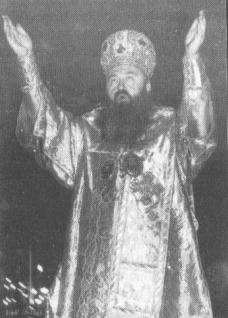
Metropolitan Nikodim (Rotov) 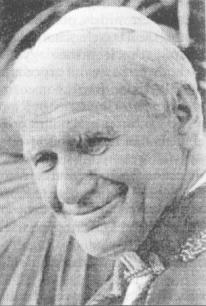
Pope of Rome -- an honorary citizen of Russia 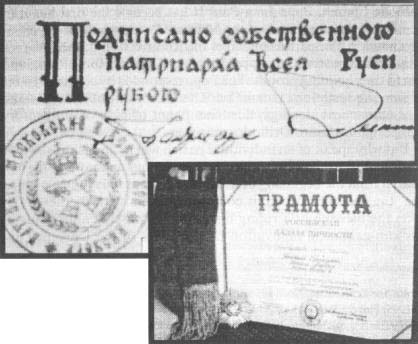
... endorsed by the Patriarch of All Russia. 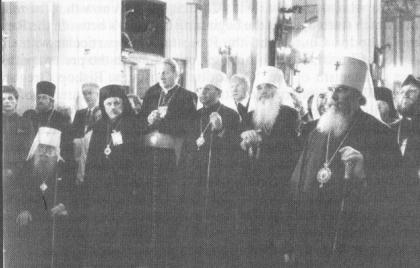
"Sister Churches" united in prayer. 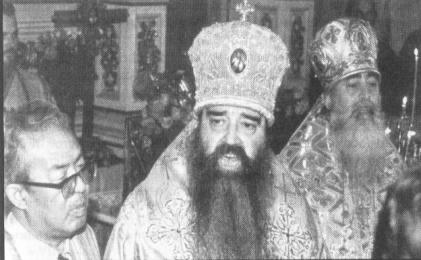
"Brotherly Communion" (Metropolitans Philaret Vakhromeev and Vladimir Kotlyarov). 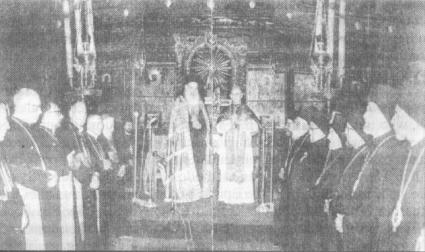
"Breathing with two lungs..." 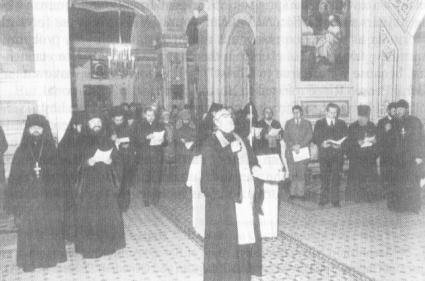
Ecumenical prayer which has gathered the Orthodox, Catholics, Monophysites and all kinds of Protestants in one of the Moscow churches is led by Archpriest Vitaly Borovoy. 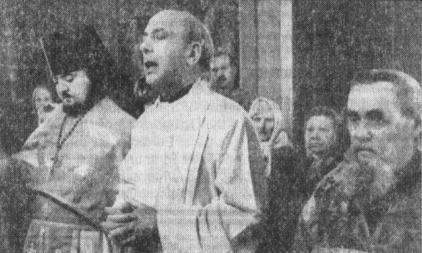
A former employee of British Military Intelligence, Canon Bruce Carpenter, conducts a special supplication service jointly with hieromonk Oleg, the Rector of St. Sergius church in the village of Tatishchev Pogost near Rostov. 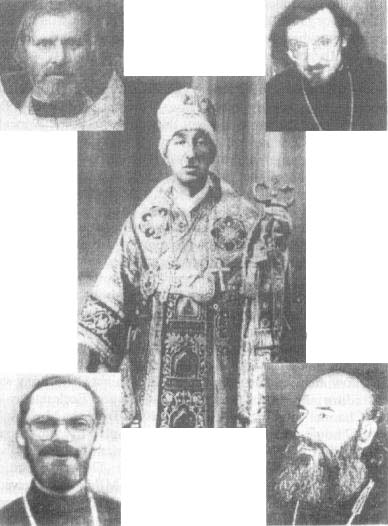
The head of the Renovationist movement A. V'vedensky and his present-day followers: A. Borisov, G. Chistyakov. G. Kochetkov, I. Pavlov (MP). Reproduction of p. 4 of the cover of the collection "Contemporary Renovationism - Protestantism of the "eastern rite". Moscow, "Odigitriya", 1996.
|
[347] Jean-Paul Pigasse, "Le grand dessein de Jean-Paul II, Enjeux du monde, Paris, No. 10, Octobre 1993, p. 25.
[348] Ibid.
[349] Archdeacon Germain Ivanoff-Trinadtzaty. "The Vatican and Russia", p. 64.
[350] Prof. Archpriest Ioann S. Romanidis, "Soglashenie mezhdu pravoslavnymi i katolikami" (Agreement between the Orthodox and Catholics), Orthodox Russia, Jordanville, N.Y., 1994, No. 1514, p. 7.
[351] Jean-Paul Pigasse, "Le grand dessein .... p. 25.
[352] In his "Epistle" to the Pope of Rome Patriarch Bartholomeos writes: "We assure you of our profound solidarity in prayer and of support which you have from me personally and from our Holy Synod". Pense Russe, 22 Jan. 1993.
[353] Bishop Gregory (Grabbe), "Ecumenism and Antichrist", Report to the Bishops' Council of 1981, from his book: "The Church and its Teaching in Life". Published by Holy Trinity Monastery, Printing Press of St. Job of Pochaev in Jordanville, 1992, v. 3, p. 121.
354. This voice of the people, alas, is now unthinkable in Russia due to spiritual damage emanating from the Moscow Patriarchate and advertised by the mass media which praise and propagate ecumenism and other kinds of moral and spiritual disintegration amongst the people who have just recently become free of the Communist yoke. The faithful and the casual worshippers (and they are in the majority) of the Moscow Patriarchate are already accustomed to watch silently and indifferently, the "Orthodox" bishops embracing on the ambo in the kiss of love with Latins, Anglicans, Protestants and other heretic, including "priestesses" and "women-bishops"
[355] See the Catholic journal The Tablet (Mar. 20, 1993); P. Keheler's book "Passion et Resurrection: l'Eglise Grecque-Catholique en Ukraine Sovietique, 1939-1989". Quoted from: La Lumiere du Thabor Revue Internationale de Theologie Orthodoxe. Fraternite Orthodoxe Saint Gregoire Palamas, Paris, No. 38, p. 127.
[356] Ibid.
[357] Archpriest Lev Lebedev, "Why I Joined the Russian Orthodox Church Abroad?", Montreal, publ. by The Brotherhood of St. Job of Pochaev, the diocese of Montreal and Canada of the Russian Orthodox Church Abroad, Montreal, 1991, pp. 26-27.
[358] See Ecumenism, No. 117, 1995. Quoted from Russkii Pastyr, San-Francisco, 1995, No. 21, p. 87.
[359] The Bishops' Council of the Russian Orthodox Church of Nov. 29 - Dec. 2, 1994. Documents, Reports. Publ. by MP, 1995, p. 191.
[360] See: Priest Timofei Selsky, "To abide in the Universal Church!", Orthodox Russia, No. 1547, 15/28 Nov., 1955, pp. 5-6.
[361] His report "Ob otnoshenii Russkoi Pravoslavnoi Tserkvi k mezhkhristianskomu sotrudnichestvu v poiskakh edinstva" (Concerning the Attitude of Russian Orthodox Church to Inter-Christian Cooperation in Search of Unity) see in the Collection of Documents and Reports of the Bishops Council of the MP of 1994, pp. 92-100.
[362] Ibid., p. 93.
[363] Comp.: Bishop Gregory (Grabbe), "Russkaia Tserkov pered litsom gospodstvuiushchago zla" (The Russian Church Face to Face with Prevailing Evil), Printing Press of St. Job of Pochaev, Holy Trinity Monastery, Jordanville, N.Y., 1991, p. 136.
[364] Archpriest John of Kronstadt, "Zhivoi kolos. Vypiski iz dnevnika za 1907-1908 gg." ( The Living Plant. Excerpts from the Diary from 1907-1908), SPb., 1909, p. 28.
[365] Vladimir Troitsky (secular name of the future New Hieromartyr Archbishop Hilarion), "Essays on the history of dogma of the Church"; later: Archimandrite Hilarion, "The Unity of the Church and the World Conference of Christian Communities". This book, first published in 1917 in one of the last issues of Bogoslovskii Vestnik (Theological Messenger), official publication of the Moscow Theological Academy, was subsequently reprinted twice. The second edition, entitled "Khristianstva net bez Tserkvi" (There is no Christianity without the Church) was published by the Brotherhood of St. Job of Pochaev in Canada (ROCA), Montreal, 1986.
[366] Bishop Gregory (Grabbe), "The Russian Church Face to Face with Prevailing Evil", p. 124.
[367] Archbishop Hilarion (Troitsky), "Khristianstva net bez Tserkvi" (Christianity or the Church), p. 74.
[368] See "The Acts of the Second Pan-Diaspora Council of the Russian Orthodox Church Abroad" with the participation of clergy and lay persons, which took place 1/14 - 11/24 August 1938 in Sremsky Karlovtsy in Yugoslavia, 1939.
[369] Archbishop Nikon (Rklitsky), "Life of Blessed Anthony, Metropolitan of Kiev and Galicia", publ, by the North-American and Canadian Diocese (ROCA), 1961, v.Vll, p. 406.
[370] Priest Timofei Selsky, "To abide in..." p. 6.
[371] Josef Vandrisse, "Novgorod-Saint Ptersbourg: un colloque multicolor", Famille Chrtienne, No. 923 du 21 septembre 1995, p. 52.
[372] Newspaper Sophia of the Novgorod diocese, No. 15, 1995, p. 2.
[373] Bulletin Aide a l'Eglise en Detresse, No. 7 - Oktobre 1994, p.4.
[374] Vedomosti Pravoslavnoi zhizni (News of Church Life), No. 2/12, 1996. Quoted from Orthodox Russia, No. 1553, 15/28 Feb. 1996, p. 12.
[375] Archpriest Ioann Sviridov, "Na putiakh sblizheniia i primireniia" (On the Paths of Rapprochement and Reconciliation) -- Pensee Russe , Paris, No. 4064, 1995, p. 16.
[376] Archpriest Arkady Shatov, archpriest Alexander Shargunov, archpriest Valentin Asmus, hieromonk Kirill Sakharov, and others, "Appeal to His Holiness the Most Holy Patriarch of Moscow and All Russia, Alexius II", Pensee Russe, No. 4106, 21-27 December 1995, p. 9.
[377] JMP, 1968, No. 3, p. 53.
[378] See "The Report of Patriarch Alexius II of Moscow and All Russia" in the Collection Bishops' Council..., p. 60; on p. 58 the "Patriarch" speaks of "good partner-like relations of the Church with other churches..." ("spiritual language"!), see also pp. 59-66.
[379] The Mirror, No. 3, April 96. Quoted from Orthodox Russia, No. 1558 (No. 9), p. 16.
[380] May the reader forgive us for quoting this non-literary expression of hegumen Innokenty (Pavlov), but from our personal experience we know that the quoted rudeness is nothing in comparison with the everyday lexical unscrupulousness of this "cleric".
[381] Archpriest Arkady Shatov, archpriest Alexander Shargunov, archpriest Valentin Asmus, hieromonk Kirill (Sakharov), and others, Appeal..., Pensee Russe, No. 4106, p. 9. (Comp. the unintentional similarity of our thought with this remark in the Appeal with regard to the Soviet logic of G. Chistyakov about which we wrote in the Chapter "The Language of Babylon" while still unfamiliar the text of the Appeal).
[382] See: Vertograd-Inform, Moscow, 1995, Nos. 6-7.
[383] Valaamets, "Perilous Oblivion. On the Question of Bishop Adalbert's (Voichek) Glorification", Orthodox Russia, No. 1547, 15/28 Nov. 1995, p. 14.
[384] Catholic Messenger of Kaliningrad, No. 6/12. Quoted from Valaamets, "Perilous Oblivion", p. 14.
[385] "Perilous Oblivion", p. 15.
[386] Bishop Ignaty (Bryanchaninov), Works, v. 1, "Ascetic experiences. On Delusion", Printing Press of St. Job of Pochaev, Jordanville, 1957, pp. 129-152. Bishop Ignaty writes about "shiploads of books being transported to Russia". And in his "Letters to lay people" (Works, v. IV, SPb., 1886, pp.485-486) he writes: "Blasphemer will not be saved!.. Devote yourself to reading-the New Testament and the Holy Fathers of the Church (and by no means about Teresa, Francis and other western madmen, whom their heretical church passes as saints!)".
[387] M. Khitrov, "Holy Great-Prince Alexander Yaroslavich Nevsky. Moscow, 1893, p. 76. The reprint edition commemorating the Millennium of the Baptism of Russia, Monastery Press, 8011 Champagneur ave.., Monreal, Canada, 1986. |